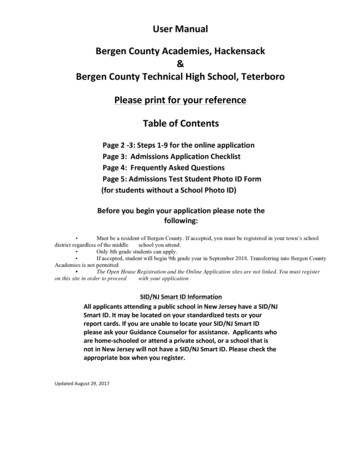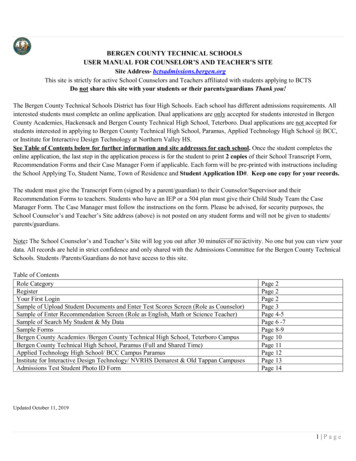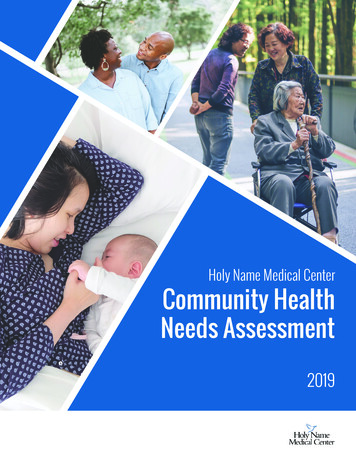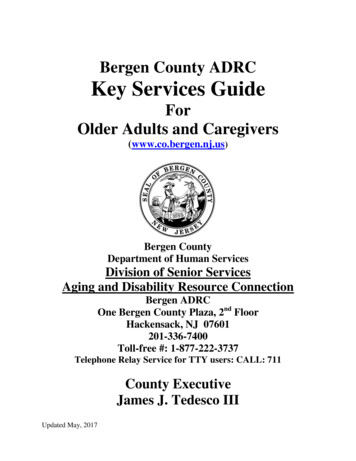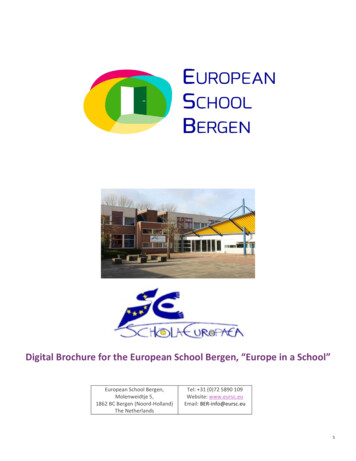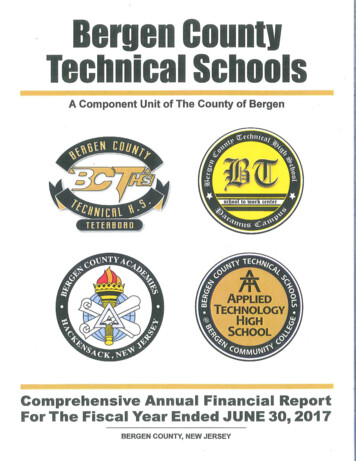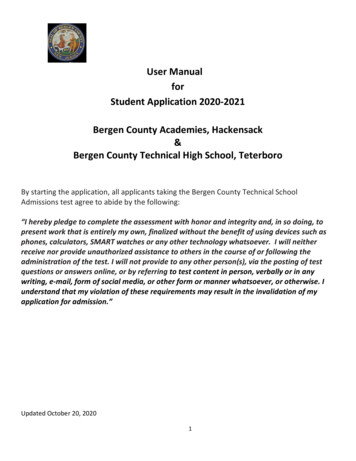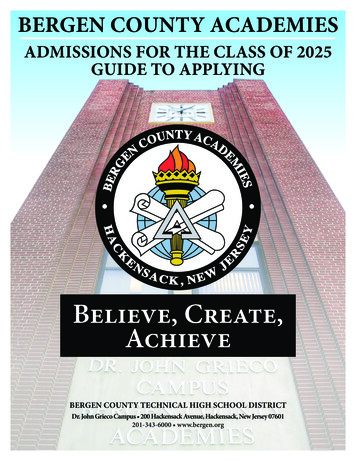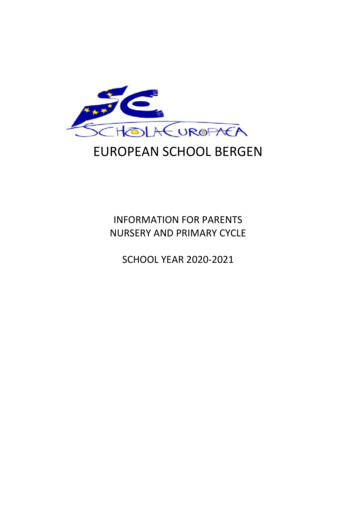
Transcription
EUROPEAN SCHOOL BERGENINFORMATION FOR PARENTSNURSERY AND PRIMARY CYCLESCHOOL YEAR 2020-2021
CONTENTS1. EDUCATION IN THE EUROPEAN SCHOOL BERGEN1.1.Admission1.2.Language sections1.3.Syllabuses1.4.Educational support2. ORGANISATION OF EDUCATION2.1.European activities2.2.Second language2.3.Religion/Ethics2.4.Reports and feedback to parents2.5Library2.6.Swimming2.7.School trips and excursions2.8.Security and supervision2.9.Medical service and procedures3. PARENTAL INVOLVEMENT3.1.Parents' Association3.2.Teacher-parents communication3.3.Parents evening booking system and My school3.4.Parents' contribution4. PRACTICAL anteen4.5.Transport4.6.After (and pre-) school care4.7.Playschool Little Europe4.8.Calendar5. NURSERY CYCLE5.1.5.2.5.3.5.4.GeneralEarly Years CurriculumOrganisation of the dayClass fund6. PRIMARY CYCLE6.1.6.2.6.3.GeneralPrimary CurriculumOrganisation of the day2
1. EDUCATION IN THE EUROPEAN SCHOOL BERGEN1.1. AdmissionRulesThe Board of Governors is the supreme decision-making body for the European Schools. It lays down the basic rules concerningthe organisation and functioning of the School. The management of the school can take local decisions concerning theadmission of pupils.To be admitted to the first year of the Nursery School a child must have reached the age of 4 in the calendar year in which theschool year begins. Newcomers may be admitted during the school year.For the first year of Primary school a child must be 6, or turn 6 in the calendar year in which Primary 1 begins.Children of staff of the European Institutions are admitted automatically on proof of entitlement.Children of staff of an institution or a firm which has entered into an agreement with the European Schools are admitted inaccordance with the terms of the agreement.Parents who are not covered by either of the categories mentioned above may make application for their children to beadmitted on a fee-paying basis, provided that there are places available in the required language section and level.In principle a child will be admitted to the language section which is the same as his or her dominant language of use; thelanguage spoken at home. In some instances it may be difficult to determine what the dominant language is. In such casesparents are invited to discuss this matter with the Deputy Director, Mrs. Nadia Roofthooft.Pupils moving on to the Primary School from the Nursery School will continue in the language section which they have alreadybeen attending.Primary and Nursery school classes are monolingual. The Board of Governors has ruled that no class should have more than 30children.ProcedureAdmission requests for Nursery school are accepted from the moment a child is 3 years and 6 months.The adminission procedure start with sending in the “Enquiry for admission form” (to be found on the websitewww.esbergen.eu). You will be contacted and asked for a copy of the child’s passport and latest school report (if applicable).For pupils transfering from Dutch schools we request the latest CITO results as well.For children from staff of the European Institutions a proof of employment will be asked.After receiving the documents mentioned above the children will be invited for an Experience day on which they will bescreened and their level compared with the classes in order to determine the appropriate (language section and) level.Parents of children with the Dutch nationality need to motivate their choice for the European school for an admissioncommittee. The motivation letter will be attached to the admission request whe have to file to the the Ministery of Education(according to Regulation nr 272245 of the Ministery of Education, Culture and Sciences)After finalizing the admission procedure the admission will be confirmed by the Deputy Director.1.2. Language sectionsThe European School of Bergen has an English, a Dutch and a French language section. All three sections operate in accordancewith the same principles and they all follow the same curriculum, although to a certain extent each section retains its ownidentity and adheres to its own cultural traditions.The teachers and the School strive to organise shared activities - sport, music, recreation, excursions and trips etc. - which bringtogether pupils from different language sections.1.3. SyllabusesWith the exception of mother tongue, the syllabuses are the same in all the language sections. They are drawn up by theinspectors, the teachers, the Directors and Deputy Directors and then approved by the Board of Governors.The syllabuses are regularly reviewed to ensure that they are in line with those of the different countries of the EuropeanUnion. The syllabuses can be found on the website of the European Schools www.eursc.eu.3
1.4. Educational SupportAll nursery and Primary teachers make use of differentiated teaching methods to support all pupils in their development. Theyclosely monitor all areas of development and make individualized interventions when needed.For pupils with learning difficulties, for whom the support by the class teacher is not sufficient, additional support can beprovided by (specialist) teachers in the nursery and primary years.‘General Support’ sessions can be organized in or outside the classroom, individually or in a small group.For pupils in need for more targeted support or with a moderate learning difficulty, extension of the general support can beforeseen for a longer period. This type of ‘Moderate Support’ will be tailored to the individual need of the pupil with an‘Individual Learning Plan’ by the support teacher.For pupils with special educational needs, requiring individualised provision of teaching or equipment or both, specialarrangements may be made. In some cases this can entail the setting up of an Intensive Support Agreement. This is based onthe information and recommendations of a medical/psychological/psycho-educational or multidisciplinary report, drawn up byan external expert. The agreement regulates the support and education of the child in a way mutually agreed by the parentsand the school.More information on the policy and provision of educational support can be found on the website of the European tudies-certificates/educational-supportand in the Whole School Educational Support Guidelines to be found on the school’s website.2. ORGANISATION OF EDUCATION2.1. European activitiesDuring the day children of all language sections meet at break to play together in the playground.Wherever possible, classes celebrate special occasions together, for example Christmas, St Nicholas, Carnival and nationalholidays. We celebrate in a relaxed and festive atmosphere which helps to foster a spirit of understanding, friendship andmutual respect.In Nursery and Primary year 3, 4 and 5 the subject ‘European Hours’ is part of the program, and pupils learn to communicateand work together beyond the boundaries of their own language.In close cooperation with the school, the Parents Association Committee organizes a yearly “Euromarket”, where the school isopen to all and there are various activities to offer.2.2. Second languageFrom Primary year 1 pupils spend one period a day learning another language. The second languages available are: English,French and German.In years 1 and 2 children get to know their second language through dialogue and play. From year 3 onwards teaching becomesincreasingly structured, with children starting to read and write in their second language.Points to bear in mindA change of second language during the Primary Cycle is inadvisable. Parents wishing to change their child's second languagemust submit a request to the Director of the school and give the reasons in writing.It is important to avoid choosing as second language what is in fact the child's third language (because of the workload andinterference across the three languages).Parents should think beyond the framework of the Primary School and bear in mind the options available in the Secondaryschool:1. In the 1st year of the Secondary Cycle all the children are obliged to learn a 3rd language.The languages currently offered are German, Dutch and Spanish.2. In the 3rd year of Secondary the children must study human sciences in their 2 nd language.3. In year 4 of Secondary the child has the option of a 4th language.4
2.3. Religion/EthicsReligion and Ethics in the primary cycle are taught in the language of the child's section. Classes are arranged if a sufficientnumber of children apply. The syllabus is set by the religious bodies. Parents who do not wish their children to attend religionclasses can register them for (secular) ethics classes.2.4. Reports and feedback to parentsDuring the early weeks of the school year, a meeting is organised by the school.The class teacher, as well as the second language teachers (for primary pupils) explain to parents how the method ofassessment works, together with the skills which will be developed during the school year and the teaching strategies whichwill be used to ensure their acquisition.Before the end of November, at an individual meeting with the parents, the child's attitude to school and social activities arediscussed. The list of cross-curricular skills serves as guide during this meeting. Any serious concern may be raised so that stepscan be taken towards improvement.For primary pupils, a first report is sent to parents electronically in February. It will have already been discussed with the pupil.It includes the completed sheet of cross-curricular skills and the range of specific skills in each area and every subject. Teacherscan add individual comments on the child’s strengths and on the areas for future development.In April/May: the Deputy Director will let you know by note, if your child risks to repeat the year. At this moment, there is stillthe possibility to redress the situation.At the end of the school year, the same range of skills is re-examined in order to establish any progression or regression. Afinal page on the primary report summarises all this information and informs the parents of the decision of the transitionmeeting regarding progression to the next school year.During the school year, parents may arrange a meeting with the class teacher or any other teacher to obtain an opinion oradvice. Contact information will be shared with the parents in the beginning of the school year (in the month of September).2.5. LibraryTo stimulate reading and encourage the pupils from nursery age onwards, the Nursery and Primary Cycle takes good care of itsown ‘Primary’ library, with a comprehensive collection of up-to-date books. The collection consists of around 6.000 books andother media in different languages: Dutch, German, English, Finnish, French, Greek, Italian, Portuguese, Spanish and Swedish.The library is open on Tuesdays from 09.00 to 11.00, on Thursdays also from 13.15 to 15.15 and on Fridays from 9.00 to 13.00.The checking out and in of books is computerized. If a child would like to get out a book, he/she will have to stop by the‘counter’. The library assistant will make sure that the book is checked out in the child’s name.Apart from the daily activities, the library organizes special events like the children’s book week and the national storytimedays. We also participate in the year programme of the public library in Bergen.We think it is important to make the library as attractive as possible. On the one hand, we do this through beautiful themeddecorations, which change with the events and seasons, and on the other hand through building a good collection of books.The library exists for pupils, teachers and parents. When you want to borrow a book you are kindly requested to make anappointement with our libararian, Mrs Karin Zijlstra (Karin.zijlstra@edu.eursc.eu).2.6. SwimmingDuring the 2017-2018 school year, a fire destroyed the local public swimming pool ‘De Beeck’. This had a very big impact onthe local community, as well as on the swimming lessons of the Primary pupils of the European School.There were practical reasons for not choosing to continue the lessons in another pool. We will offer swimming lessons againwhen “De Beeck” reopens.5
2.7. School trips and excursionsAll language sections in the Nursery and Primary Cycle take part in trips and school excursions.The main aims of which are to: learn how to get on as a group get to know different environments give practical expression to the European spiritThe class trips are related to the themes that the pupils are working on and are limited to one day.Parents will be informed about the trip and can be asked to help.In year 5 of Primary a residential trip is organized lasting 4 days and 3 nights.The school trip schedule may be adjusted or cancelled when mandatory measures to prevent the spread of Covid-19 areapplicable. All changes to the standard regulartions as mentioned above will be communicated to the parents2.8. Security and supervisionSecurityPrimary GateThe primary gate is the entrance to the Nursery and Primary school. The gate opens (daily) at 08.40 hrs.Parents of nursery pupils accompany the children to the nursery class.Primary pupils come onto the playground by themselves. The younger pupils from P1 and P2 immediately make their way totheir class room. The older pupils from P3, P4 and P5 will wait on the playground, where a teacher on duty will supervise thechildren before the start of the school day. Primary P3/4/5 teachers will come to pick the pupils up at 8.55h, when the bell rings.The gate closes at 09.15. All parents are requested to have left the school premises at that time.After 09.15h the main entrance needs to be taken to leave school. Parents who have appointments and need to stay in schoolafter 09.15 h are considered visitors and need to register at the main gate.On short days (Wednesdays, Fridays and Tuesdays for Nursery, P1 and P2 ) the gate is open for picking up the pupilsfrom 13.00 h till 13.30 h. On long days (Mondays, Tuesdays (for P3, P4 and P5) and Thursdays the gate is open for pick up from16.15 h till 16.45 h.Tuesday is a short day for Nursery and P1 and P2. Nursery school pupils can be picked up in their classes.Main GateThe main gate is open daily from 08.30 h till 17.00 h. Trigion Security controls the entrance of visitors. All visitors are toregister and obtain a visitors badge. Identification will be asked.The entrance policy may be adjusted when mandatory measures to prevent the spread of Covid-19 are applicable. All changesto the standard regulartions as mentioned above will be communicated to the parentsSupervisionThere are teachers on duty at the playground before and after school. In the morning from 08.40 till school starts and afterschool between 13.10 and 13.30 hours on short days and between 16.25 and 16.45 hours on long days.During breaktimes there are always teachers on duty.2.9. Medical service and proceduresSchool nurseThe school provides medical service. The school nurse is available for first aid and other medical issues that occur in schooldaily during school hours (9-16.30). When for unforeseen reasons a nurse will not eb in school, first aid trained personal isavailable for emergencies. The school nurse can be reached through email ber-nurse@eursc.eu or telephone: 072-5890199.Medical informationPlease provide us with information about your child’s medical condition (if applicable) and keep the information updated. Yourfamily doctor’s contact information is essential.Medical examinationsAll nursery school pupils can be examinated by a doctor of the GGD (the Dutch Health Association). This examination is notmandatory and you will be informed when they take place.6
In P5 the pupils will be medical examinated again by the nurse of the same organisation.ProceduresAbsence due to illness:Inform the school by sending an email to the address: primarychild.absent@esbergen.org with the class teacher (and whenapplicable, the Mother Tongue teacher) in CC of your message.Please include full name of the pupil and the class.Medication for children at schoolMedication must be given to the class teacher. The nurse needs to be informed. Parents have to hand in a writtenauthorisation.Under no circumstances medication may be kept in the school bag.AccidentsIn case of a serious accident at school, the parents will be contacted by the school nurse or the class teacher. If the parentscannot be contacted the school will take whatever action is necessary and will inform the parents as soon as possible. In caseimmediate action of a hospital is required an ambulance will be called. The child will be accompanied by the nurse or otherstaff member while all effort will be taken to inform the parents about the situation. Please provide us with an emergencycontact .A report will be made stating time and date of the accident/incident, an explanation of what happenend, the injuriesand the actions taken.Head Lice protocolIt is likely that head lice sometimes show up in a Nursery/Pirmary environment. Although there is no threat for the pupils, thelice cause a lot of trouble to the parents and the children affected.The school has a lice protocol in place to deal with this.Parents are responsible to inform the school if head lice are detected and to treat their child(ren) when needed.Infectious diseaseIn case of a child suffering from an infectious disease, parents are obliged to notify the school nurse as soon as possible.3. PARENTAL INVOLVEMENT3.1. Parents’ AssociationThe role of the Parents' Association is important in the various committees and working parties of the European Schools. TheAssociation's views and suggestions on the way the School is organised are put forward by parents' representatives at theAdministrative Council and the Educational Council. The Association is also represented on the Board of Governors and thePedagogical and Reform Committees.With the assistance of the School, the Parents' Association organises extracurricular activities. Registration for these activities(sports and artistic activities) is to be done at the beginning of the school year via the website and requires a financialcontribution. Parents are reminded that there are no teachers on duty before or after these activities.Parents' Association:Wednesdays 12:00-13:00 (Secondary Cycle, room 39)website: www.europeanschool-parents.nlEmail: info@europeanschool-parents.nlAt the beginning of each school year, one (or two) class parent(s) representative(s) will be elected for each class. The classparent reps are important links for information, as well as a contact point for parents. (Tasks and responsibilities can be foundon the website of the Parents’ Association)3.2. Teacher-Parents communicationParents’ eveningAt the beginning of a new school year a meeting will be held for parents to meet their children’s class teacher (as well as theReligion/Ethics teacher and Language 2 teacher). Parents will be informed about the dates of these meetings at the end of therunning school year.7
AppointmentParents wishing to discuss their child's progress with the class teacher should make an appointment. Teachers will inform theparents about the official appointment times at the beginning of the school year.Appointments with teachers are not possible on the first school day or on the first day of a term.In addition to official meetings, parents are invited to accompany class outings or to help organise activities or events in class.3.3 Parents evening booking system and My schoolFor parents evenings and events (Summer- and Christmas concert) school will ask parents to make theirprecense known through the parents evening booking system. The system will not only help school toorganize the event but will also help guard the safety of all attendees. Instructions about how to registerinto the system will be provided. The student ID which is required to make a booking can (also) be foundon your child’s school badge. You are expected to save the system.co.uk).The school report for primary pupils is issued through the MY school system. Log in information is initiatedand automatically sent to you upon enrolmentParents involvement and Parents-teachers communication may be adjusted or cancelled when mandatory measures to preventthe spread of Covid-19 are applicable. All changes to the standard regulartions as mentioned above will be communicated tothe parents3.4. Parents’ contribution Intermath : There will be a charge of 28 euros per primary child for the Maths’ books which the children will receive atthe beginning of the school year.School trips and outings: Parents will be informed about the destination and the duration of the the school trips andoutings, well in advance. Parents are asked to give their consent about their children participating in the school tripsand outings when enrolling. Contributing costs are 30 euros for nursery and 60 euros for primary school pupils. Theamount covers all trips and outings for the whole school year. For P5 pupils an extra 260 euros is required for theresidential trip.Books and material: The parents are asked to buy the books and other non educational material which will be neededin class. All language sections have a book fund for parents to sign in for a joint purchase of books and schoolmaterials.Books and materials for LII will be communicated to you at the end of the school year 2018-2019.Class fund: Primary class parent representatives manage a small class budget, to organise social events, gifts and/orother extras. Parents can be asked to contribute for approximately 15 euros per school year.For Nursery pupils, the class fund is 50 euros and covers for more (see 5.4)4. PRACTICAL INFORMATION4.1. PrivacyThe European School Bergen has always taken the protection of personal data very seriously.The General Data Protection Regulation (GDPR) is a legal framework from the EU that has taken effect from May 2018 and isdesigned to accomplish two main things:1.2.Unify the current data protection laws throughout the EUEnhance the rights of citizens of the EU to protect their personal informationIn all European Schools the implementation of the GDPR is applied in the same way so that all schools are compliant with therules.8
One of the obligations of the GDPR is to publish privacy statements for all members of the school community as we process alot of data.You can find the privacy statements on our website. In the privacy statements you can read how we collect and share data, andthere is information about what to do if you are not in agreement.Parents will be asked to formalize their consent in the digital ‘Myschool’ environment (School Management System). Each yearverification needs to done by parents during their first login.Photos of your childrenFor taking and publishing identifiable photos of the pupils, the school will ask for consent from the parents. If we don’t haveconsent the school will not publish the photos.The European School Bergen is NOT responsible for photos taken by parents, friends etc. during school trips, school events etc.In GDPR terms: the School is not the processor of this photos and videos.4.2. AbsencesParents are responsible to ensure that their children arrive at school and leave on time and that they attend regularly withoutany prolonged absences.Absence for medical reasons:If a pupil is unable to attend school due to illness or medical appointment, parents should inform the school by email:primarychild.absent@esbergen.org with the class teacher (and when applicable, the Mother Tongue teacher) in CC. Pleaseinclude the full name of the pupil and the class.Please inform the school as easly as possible, to assure all staff (and in case of early pick-up, also security) can be informed.In the case of a long absence for medical reasons, parents are asked to keep the school informed.Absence for non-medical reasons:Referring to the General Rules of the European Schools .pdf , Art.30,3.c), permission for absences for any other reason than medical need to be granted by the Deputy director“Except in cases of force majeure, the pupil’s legal representatives must apply for such permission at least one week inadvance. Applications must be made in writing, indicating the period of absence and giving reasons.”Parents are asked to file their request via E@eursc.euAbsences for the week preceding or the week following the school holidays will, except for serious family problems, not begranted.Our school is in close collaboration with the Educational officer and all unjustified absences will be reported to the Educationalofficer for pupils being 5 years old and older.4.3. ContactSECRETARY Nursery and Primary Cycle:Mrs Nicole Fri 08.30-12.30DEPUTY DIRECTOR Nursery and Primary Cycle:Mrs Nadia RY-AND-PRIMARY-CYCLE@eursc.euThe official home-page of European Schools is: www.eursc.eu and the official website of the European School Bergen is:www.esbergen.eu.9
4.4. CanteenThe different age groups have different lunch times: P1 and P2 pupils have lunch first, Nursery pupils after that and P3, P4 andP5 are last to have lunch before the secondary pupils have their break.Nursery and P1/2 children can bring a packed lunch from home or sign up for a hot lunch (*), which will be consumed in thecanteen.On long days the P3/4/5 children all go to the canteen where they can have their lunch.They can either have a packed lunch from home, sign up for hot lunches or buy lunch at the school’s cafeteria Luna Rossa(*) information to obtained at the cafeteria through lunarossacatering@gmail.com and or 06-81939355All lunch breaks, in class or in the canteen are supervised by teachers.Canteen arrangments may be adjusted or cancelled when mandatory measures to prevent the spread of Covid-19 areapplicable. All changes to the standard regulartions as mentioned above will be communicated to the parents4.5. TransportFor pick up and drop off there are parking places near the school. Parents who take their children to and from the school arerequested not to park in the residential area or in the places reserved for the school buses.Bicycles can be stalled in the bicycle area on the primary playground and near the gate.For children not living close to school parents have organized a door-to-door busservice.The service runs from the Amsterdam area.For more information about the Amsterdam service, please contact ESBbus@gmail.comTransport service to Alkmaar and surroundings is outsourced to Taxi-072.For the Alkmaarservice contact info@taxi-072.nl (www.taxi-072.nl).The school has no part in the transport arrangements. It is the parents obligation to inform school aboutschool transport arrangements (and changes) at all time and they are to inform the buscompany aboutchanges in the school schedule that may influence the transport arrangements (snow days, residentialtrips, sport days, school outings etc.)4.6. After (and pre-) school careThe European School offers the facility of child care in cooperation with Child Care organization ALLES KITS. The day care centreAlles Kits is not a part of the European School.For more information, please visit their website www.alleskits.org or send an email to info@alleskits.org4.7. Playschool Little EuropeOur school facilitates an international playschool in our nursery section. Playschool Little Europe is multi-lingual (they speak thelanguages of the school’s language sections: French, Dutch and English) and they host children in the ages 2 to 4. Informationcan be found on www.europeanplayschool.com playschoollittleeurope@gmail.com.10
4.8. CalendarCALENDAR OF THE SCHOOL YEAR 2020-2021BEGINNING OF THE SCHOOL YEARWednesday 03-09-2020AUTUMN/HALF TERM BREAKfrom Monday 26-10-2020up to and incl. Monday 02-11-2020CHRISTMASFrom Monday 21-12-2020up to and incl. Friday 01-01-2020FEBRUARY/ HALF TERM HOLIDAY(CARNIVAL)*from Monday 15-02-2021up to and incl. Friday 19-02-2021*EASTERFrom Monday 29-03-2021up to and incl. Friday 09-04-2021KING’s DAYTuesday 27-04-2021MAY HOLLIDAYFrom Monday 10-05-2021up to and incl. Friday 14-05-2021WHITSUNMonday 24-05-2021END OF THE SCHOOL YEARFriday 02-07-2021FIRST SCHOOL DAYSCHOOL YEAR 2020-2021(to be confirmed)Tuesday 02-09-2021*The training day for teachers will take place on MONDAY 22nd February 2021 All students will be free this day11
5. NURSERY CYCLE5.1. GeneralChildren are taught in their mother tongue. They are enrolled in the appropriate language section when they join school, ifnecessary after consultation between the parents and the school.Each class has a full time teacher. The Board of Governors has ruled that no class should have more than 30 children. If thenumber of pupils exceeds 30 a second class will be created. When a class has more than 15 pupils, the teacher has an assistant.The assistant’s hours are determined by the size of the class and the rules drawn up by the Board of Governors.5.2. Early Years CurriculumEarly Education teaching and learning is holistic and different areas of development are not separated. In daily school life thechildren, their experiences and actions are central. Pupils’ positive self-concept will strengthen and they will build basic skills,knowledge and capabilities from different areas of learning, in accordance with their age and abilities.Learning by playing is essential!From September 2011 the Early Education Curriculum has been in force.The core content of the Early Education Curriculum consists of the following four areas: Me and my body Me as a person Me and the others Me and the worldThese areas are based on physical, psychological, social, cognitive and emotional d
1. EDUCATION IN THE EUROPEAN SCHOOL BERGEN 1.1. Admission Rules The Board of Governors is the supreme decision-making body for the European Schools. It lays down the basic rules concerning the organisation and functioning of the School. The management of the school can take local decisions concerning the admission of pupils.
